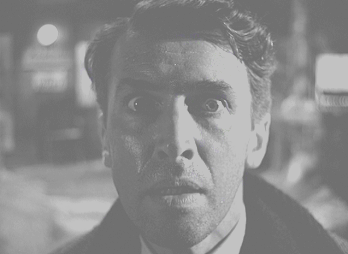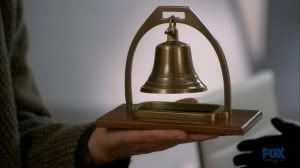
Strange, isn't it? Each man's life touches so many other lives. When he isn't around he leaves an awful hole, doesn't he?
- Clarence, Angel, 2nd Class
I know what it's like to have a hole in my life. It's been there as long as I can remember.
- Olivia Dunham, Fringe Division
"Neither Here Nor There" is a title that evokes a few things. First and foremost, the strange here/not here existence of Peter Bishop; the fact that the present timelines have changed; and perhaps most importantly, the little piece of real estate that now exists beneath the Statue of Liberty. Right now, the show's reality is like a Venn Diagram - the two spheres that threatened to smash into each other have now partly merged and that merged sliver is, quite literally, neither here nor there. It's a bridge that owes allegiance to neither side. While watching the episode I was frequently reminded of another story whose bridge was crucial to its story: It's A Wonderful Life.
Certainly a few people have referenced Frank Capra’s classic 1946 film when discussing how we’re getting a chance to see what life would have been like without Peter. But a closer look makes me wonder if this isn’t not only more than a mere resemblance, but a basic part of the frame that was designed for the show from the beginning.
Everyone knows the basic story of It’s A Wonderful Life, of course. Its protagonist George Bailey (played by Jimmy Stewart) grows up in the small town of Bedford Falls, longing to leave the small town some day and make something of himself:
I'm shakin' the dust of this crummy little town off my feet and I'm gonna see the world. Italy, Greece, the Parthenon, the Colosseum. Then, I'm comin' back here to go to college and see what they know. And then I'm gonna build things. I'm gonna build airfields, I'm gonna build skyscrapers a hundred stories high, I'm gonna build bridges a mile long…
His father, along with his dotty Uncle Billy, started the town’s modest Savings and Loan, thereby helping to improve the quality of life for their friends and neighbors, which naturally sticks in the craw of the heartless Mr. Potter (Lionel Barrymore) who owns just about everything else.
George sympathizes with what his father has accomplished, but part of him naturally rejects the prospect of a life spent in Bedford Falls. What follows is the story of how George’s simple decency thwarts his attempts to leave the town, again and again, as he tries to preserve the and protect the little town from the encroachment of turbulent economic times, as well as the sinister and hateful machinations of Mr. Potter.
Is it too much to suggest that, even at this point, we could draw some interesting comparisons? George Bailey is repeatedly given the choice to be Bishop or Bell, embrace his father’s legacy or become a savvy, world-beating businessman. Peter Bishop’s story is basically that of how he comes to embrace his father’s legacy and, in so doing, his father himself. He’s a George Bailey that managed to leave Bedford Falls and has to learn the value of humility and belonging to a family. George eventually learns this himself when he defends him to Mr. Potter:
You're right when you say my father was no businessman. I know that. Why he ever started this cheap, penny-ante Building and Loan, I'll never know. But neither you nor anyone else can say anything against his character, because his whole life was... why, in the 25 years since he and his brother, Uncle Billy, started this thing, he never once thought of himself. Isn't that right, Uncle Billy? He didn't save enough money to send Harry away to college, let alone me. But he did help a few people get out of your slums, Mr. Potter, and what's wrong with that?
Without going into the details that are so familiar to anyone who’s seen the film (just about everyone), George comes to terms with what is a modest existence, perfectly happy marrying the sweetheart who has loved him since childhood. But the delicacy of this fragile happiness becomes evident when his absent-minded Uncle Billy loses a crucial bank deposit, something which Mr. Potter witnesses and keeps to himself, all the better to destroy George’s life:
Look at you. You used to be so cocky. You were going to go out and conquer the world. You once called me "a warped, frustrated, old man!" What are you but a warped, frustrated young man? A miserable little clerk crawling in here on your hands and knees and begging for help. No securities, no stocks, no bonds. Nothin' but a miserable little $500 equity in a life insurance policy. You're worth more dead than alive.
Potter now has exactly what he needs to ruin George’s life. It’s all finally too much for George who decides that Potter is right and makes his way to the nearest bridge. But right before he jumps, another body beats him to it and George automatically jumps in to save his life. The individual turns out to an angel named Clarence who’s out to get his wings and plans to show George how different the world would have been had he never lived at all.
The picture’s last act is a litany of nightmare and woe, most of which we’re prepared for since we know George’s story so well. Bedford Falls has become Pottersville, a sad and depraved town where no one seems to care much for anyone else’s well-being. No one knows George and everyone’s faces seem to reflect sadness, selfishness, or cruelty. He tries in vain to make people recognize him, but no one is interested. His adorably odd Uncle Billy now resides in the local insane asylum, driven mad by losing the money. Worst of all, his own wife Mary, normally a loving and vivacious woman, has completely shut down emotionally and is barely a shell of a human being.
And here is our Olivia, perhaps even more of an emotional basket case than the one we met in the first episode. Uncle Billy’s fate hardly needs any elaboration from me:
You used to call me "Uncle Walter," do you remember?
But the picture’s most frightening moment comes when George finds himself face to face with the tombstone of his brother Harry, much like Walter with Peter’s:
Clarence: Your brother, Harry Bailey, broke through the ice and was drowned at the age of nine.
George Bailey: That's a lie! Harry Bailey went to war! He got the Congressional Medal of Honor! He saved the lives of every man on that transport!
Clarence: Every man on that transport died! Harry wasn't there to save them, because you weren't there to save Harry!
Is this even necessary to quote?
I was unable to control my limbs in that icy water…I was incapable of saving you, or myself. We were dead, Peter, you and I. Until someone grabbed me. And we were going up. We were saved, both of us, by a man that I had never met. A man that shouldn't have been there at all. He pulled us to the shore. I remembered that he was bald, that he had no eyebrows.
The man who “shouldn’t have been there at all” was, in Walter and Peter’s case, an Observer whose actions seem to have prevented what (on the basis of Season 4’s first episode) would have been even sadder and more emotionally stunted lives for Olivia and Walter, a veritable Pottersville of the soul. The dark paradox here is that this is, we are told, the way things were actually intended to play out. The three years previous to this were an anomaly that never should have happened. If that life, however, is an improvement, is there a moral imperative not to change it back? If September is Peter’s guardian angel, there’s a macabre joke in his being assigned to eliminate him after he, like George Bailey, disappears from a “bridge.”
For all the talk about Alice In Wonderland or The Wizard Of Oz providing templates for the show, is it too much to consider that FRINGE might also be retelling the story of someone who discovered that “sometimes when one walks away from his fate, it leads one directly to fate's doorstep”? Both stories begin with a boy who falls through the ice on a lake but is saved from drowning and both reach a crisis point when reality seemingly erases them from existence, creating a far poorer world for everyone they knew. It's far too similar to be coincidence. Even Peter and Walternate’s last confrontation carries with it a bit of Potter twisting the knife in:
Soon everyone here will experience loss the way that all those over there did. Air, water... light, even. But you... you will experience loss the way I did…You destroyed my universe, son, and I'm going to destroy yours. And not all at once.
Potter’s dig about how George was once going to “conquer the world” has chillingly become Walternate’s very real threat to “destroy the universe.” Even his pose frozen in the chair is like Potter as well, albeit for very different reasons.
So has September seen reality and found it wanting? Has he decided that his mission to preserve the timestream must answer now to a higher code of ethics? And if he decides to preserve Peter instead, doesn’t the future run a far more likelier risk of Doomsday?
In It’s A Wonderful Life, George Bailey, having been shown a world without him, decides that he wants to live again and asks for Clarence’s help in doing so. With reality restored, he returns to his family to find that all of his friends and neighbors have chipped in to make up the missing bank payment and ultimately learns that “no man is a failure who has friends.” But it’s his daughter Zuzu (whose flower petals, interestingly for FRINGE fans, signal to George that reality has returned to normal) who has the last word:
Look, Daddy! Teacher says, every time a bell rings an angel gets his wings!

And what does this first episode do but show us Walter giving something back its wings? Stay tuned for that bell.













3 Comments:
Great comparison! I hadn't thought of the "It's a Wonderful Life" parallel before. Rooting for September to restore Peter!!! Walter and Olivia are just too sad without him.
We've seen this on TV before. The Muppets did it. It also happened to J.R. in Dallas.
That said, it would be interesting if there were twists down the road.
Thanks, Blue! I think the fact that a boy drowning in an icy lake was planted so early in the series says that IAWL has been part of the show's pattern from the beginning.
And not claiming this hasn't been done before, Xindilini, but FRINGE has a tendency to use other shows and films as structural material. I was just surprised to see how many of these IAWL motifs had been woven in all along. I'm just arguing that their full measure hadn't been taken into account.
Post a Comment
Formatting Key:
- <b>bold</b> = bold
- <i >italic</i> = italic
- <a href="http://fringetelevision.com/">link</a> = link
Anonymous posting has been turned off.